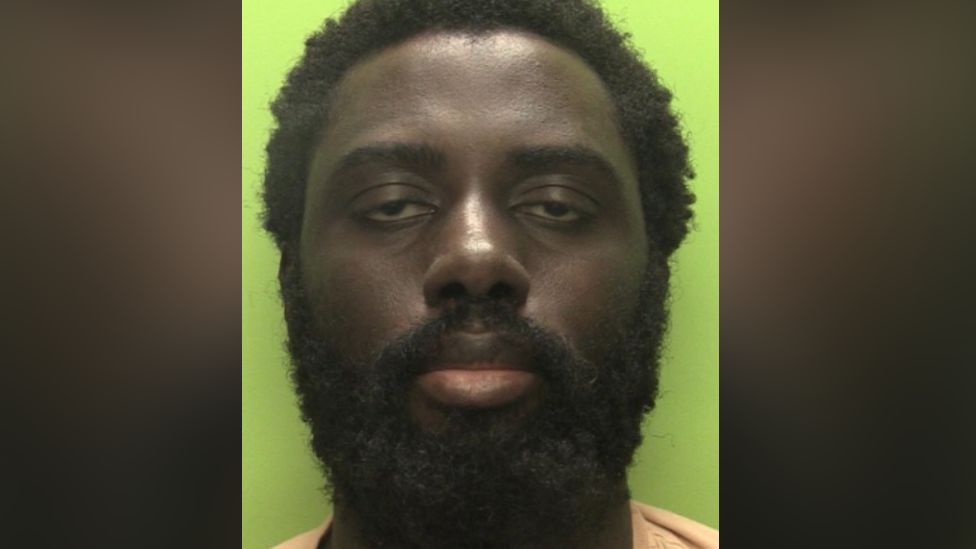Nottingham attacks: NHS to investigate Valdo Calocane's case
- Published

A court heard Valdo Calocane suffered from paranoid schizophrenia
NHS England is to order a major investigation into triple killer Valdo Calocane's contact with mental health services, stretching back four years.
The 32-year-old fatally stabbed students Barnaby Webber and Grace O'Malley-Kumar, before killing school caretaker Ian Coates last June.
A court heard he had been diagnosed with paranoid schizophrenia.
The Independent Mental Health Homicide Review will examine what can be learned from the case.
On Thursday, Calocane was sentenced to a hospital order, after pleading guilty to three counts of manslaughter on the basis of diminished responsibility, and three counts of attempted murder.
It has since been confirmed that the attorney general's office has received a referral arguing the sentence was unduly lenient.
Among the questions the NHS England investigation is likely to examine is whether the killings could have been predicted or prevented.
Ian Coates, Barnaby Webber and Grace O'Malley-Kumar died at the scene of the attacks
At Calocane's sentencing hearing, it was revealed the former University of Nottingham student believed MI5 was spying on him.
His mental illness began in 2019 and he had been detained under the Mental Health Act at a psychiatric unit in Nottingham four times since May 2020.
On each occasion, he was discharged - the final time in February 2022, more than a year before the killings.
He was prescribed anti-psychotic medication but stopped taking it, which the prosecution said led to a further decline in his mental health.
Families of Calocane's victims have questioned the care received by the killer in the years leading up to the attacks.
Grace O'Malley-Kumar's father, Dr Sanjoy Kumar, said: "While we have never questioned this man's diagnosis, the lack of toxicology, contemporaneous mental health assessment, as well as missed opportunities to divert his lethal path will forever play on our minds and this requires further review.
"We will look for answers regarding missed opportunities to intervene and prevent this horrendous crime."
Nottinghamshire Healthcare NHS Foundation Trust, which runs mental health services in the county, said in a statement it had "robustly" reviewed its interactions with Calocane.
Chief executive Ifti Majid said: "It is important to remember that this person has been convicted of a crime of the most serious kind and there are many people who live with severe mental health issues who do not offend and are supported to live well in their community.
"We always aim to care for people in the least restrictive way and to support people to live well in their own homes and society.
"If a patient no longer engages with our services and support and they do not meet criteria to be detained under the Mental Health Act, they are discharged back to the care of their GP and can be referred back into our services at any time."
Dr Mike Harris said there would be a lot for the investigation to look at
The exact terms of reference of the independent review and the panel that will lead it have yet to be appointed.
It is expected it will take many months to complete.
Dr Mike Harris, a consultant psychiatrist and former director of Rampton high-security hospital in Nottinghamshire, said examining whether the attacks could have been prevented would be a "very difficult question".
He said: "Essentially it goes back to the observation when he was admitted to hospital nearly a year and a half earlier.
"Was there anything in his presentation at that time that would have given any clue to the fact that he might become violent in the future?
"It could be there were reasons to follow him up and the follow-up failed for some reason, and in a way that is the most important thing an inquiry can look at.
"Did he get better during his admission in 2022 and when he had that, did they arrange appropriate follow-up and did that follow-up happen?"
Follow BBC East Midlands on Facebook, external, on X, external, or on Instagram, external. Send your story ideas to eastmidsnews@bbc.co.uk, external.
Related Topics
- Published24 January
- Published24 January
- Published24 January